| Listing 1 - 10 of 12 | << page >> |
Sort by
|
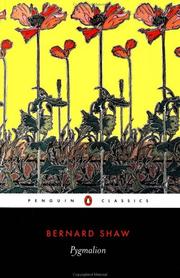
ISBN: 0141439505 0141901276 Year: 2000 Publisher: London Penguin Books
Abstract | Keywords | Export | Availability | Bookmark
 Loading...
Loading...Choose an application
- Reference Manager
- EndNote
- RefWorks (Direct export to RefWorks)
Pygmalion both delighted and scandalized its first audiences in 1914. A brilliantly witty reworking of the classical tale of the sculptor who falls in love with his perfect female statue, it is also a barbed attack on the British class system and a statement of Shaw's feminist views. In Shaw's hands, the phoneticist Henry Higgins is the Pygmalion figure who believes he can transform Eliza Doolittle, a cockney flower girl, into a duchess at ease in polite society. The one thing he overlooks is that his 'creation' has a mind of her own. This is the definitive text produced under the editorial supervision of Dan H. Laurence, with an illuminating introduction by Nicholas Grene, discussing the language and politics of the play. Also included in this volume is Shaw's preface, as well as his 'sequel' written for the first publication in 1916, to rebut public demand for a more conventionally romantic ending.
Theatrical science --- English literature --- Shaw, George Bernard --- Social classes --- Speech and social status --- Linguistics teachers --- London (England) --- Teachers
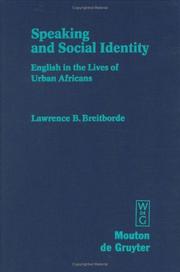
ISBN: 9783110893083 3110893088 3110147963 9783110147964 Year: 1998 Publisher: Berlin Mouton de Gruyter
Abstract | Keywords | Export | Availability | Bookmark
 Loading...
Loading...Choose an application
- Reference Manager
- EndNote
- RefWorks (Direct export to RefWorks)
No detailed description available for "Speaking and Social Identity".
Sociolinguistics --- English language --- Liberia --- Speech and social status --- Languages in contact --- Urban dialects --- Social aspects --- Spoken English
Book
ISBN: 0801470706 1322522588 0801470714 9780801470714 9780801452567 0801452562 9780801479205 0801479207 9780801470707 9781322522586 Year: 2014 Publisher: Ithaca London
Abstract | Keywords | Export | Availability | Bookmark
 Loading...
Loading...Choose an application
- Reference Manager
- EndNote
- RefWorks (Direct export to RefWorks)
Many activists worry about the same few problems in their groups: low turnout, inactive members, conflicting views on racism, overtalking, and offensive violations of group norms. But in searching for solutions to these predictable and intractable troubles, progressive social movement groups overlook class culture differences. In Missing Class, Betsy Leondar-Wright uses a class-focused lens to show that members with different class life experiences tend to approach these problems differently. This perspective enables readers to envision new solutions that draw on the strengths of all class cultures to form the basis of stronger cross-class and multiracial movements. The first comprehensive empirical study of US activist class cultures, Missing Class looks at class dynamics in 25 groups that span the gamut of social movement organizations in the United States today, including the labor movement, grassroots community organizing, and groups working on global causes in the anarchist and progressive traditions. Leondar-Wright applies Pierre Bourdieu's theories of cultural capital and habitus to four class trajectories: lifelong working-class and poor; lifelong professional middle class; voluntarily downwardly mobile; and upwardly mobile. Compellingly written for both activists and social scientists, this book describes class differences in paths to activism, attitudes toward leadership, methods of conflict resolution, ways of using language, diversity practices, use of humor, methods of recruiting, and group process preferences. Too often, we miss class. Missing Class makes a persuasive case that seeing class culture differences could enable activists to strengthen their own groups and build more durable cross-class alliances for social justice.
Intercultural communication --- Class consciousness --- Speech and social status --- Social movements --- Social classes --- Consciousness --- Social perception --- Social classes and language --- Social classes and speech --- Social status and language --- Social status and speech --- Speech and social classes --- Social status
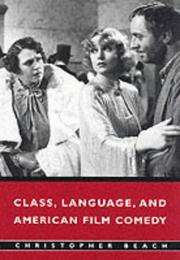
ISBN: 9780511606342 9780521807494 9780521002097 0511020422 9780511020421 0511029187 9780511029189 0521807492 0511606346 9780511044472 051104447X 0511157878 9780511157875 0521002095 9786610419319 6610419310 1107124565 9781107124561 0511323603 9780511323607 1280419318 9781280419317 0511176996 9780511176999 Year: 2002 Publisher: Cambridge, UK ; New York : Cambridge University Press,
Abstract | Keywords | Export | Availability | Bookmark
 Loading...
Loading...Choose an application
- Reference Manager
- EndNote
- RefWorks (Direct export to RefWorks)
This book examines the evolution of American film comedy through the lens of language and the portrayal of social class. Christopher Beach argues that class has been an important element in the development of sound comedy as a cinematic form. With the advent of sound in the late 1920s and early 1930s, filmmakers recognized that sound and narrative enlarged the semiotic and ideological potential of film. Analyzing the use of language in the films of the Marx Brothers, Frank Capra, Woody Allen and the Coen brothers, among others, Class, Language, and American Film Comedy traces the history of Hollywood from the 1930s to the present, while offering a new approach to the study of class and social relationships through linguistic analysis.
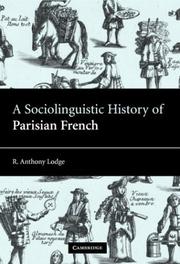
ISBN: 0521821797 0521100712 1107145732 0511185499 0511184662 0511326998 0511486685 1280457880 0511187297 0511186363 9780521821797 9780511187292 9780511186363 9780511185496 9780511184666 9780511486685 9781280457883 9786610457885 6610457883 9781107145733 9780511326998 9780521100717 Year: 2004 Publisher: Cambridge Cambridge University Press
Abstract | Keywords | Export | Availability | Bookmark
 Loading...
Loading...Choose an application
- Reference Manager
- EndNote
- RefWorks (Direct export to RefWorks)
Paris mushroomed in the thirteenth century to become the largest city in the Western world, largely through in-migration from rural areas. The resulting dialect-mixture led to the formation of new, specifically urban modes of speech. From the time of the Renaissance social stratification became sharper as the elites distanced themselves from the Parisian 'Cockney' of the masses. Nineteenth-century urbanisation transformed the situation yet again with the arrival of huge numbers of immigrants from far-flung corners of France, levelling dialect-differences and exposing ever larger sections of the population to standardising influences. At the same time, a working-class vernacular emerged which was distinguished from the upper-class standard not only in grammar and pronunciation but most markedly in vocabulary (slang). This book examines the interlinked history of Parisian speech and the Parisian population through these various phases of in-migration, dialect-mixing and social stratification from medieval times to the present day.
804.0-087 --- French language --- -French language --- -Speech and social status --- -Social classes and language --- Social classes and speech --- Social status and language --- Social status and speech --- Speech and social classes --- Social status --- Langue d'oïl --- Romance languages --- 804.0-087 Frans: dialecten --- Frans: dialecten --- Social aspects --- -Dialects --- -Variation --- -Paris (France) --- -Social life and customs --- -804.0-087 Frans: dialecten --- Social classes and language --- Langage et statut social --- -Frans: dialecten --- Speech and social status --- Dialects --- Variation --- Paris (France) --- Social life and customs. --- Sociolinguistics --- Dialectology --- Paris --- Français (Langue) --- Aspect social --- Dialectes --- Moeurs et coutumes --- France --- Arts and Humanities --- Language & Linguistics --- French language - Social aspects - France - Paris --- French language - Dialects - France - Paris --- French language - Variation - France - Paris --- Speech and social status - France - Paris --- Paris (France) - Social life and customs
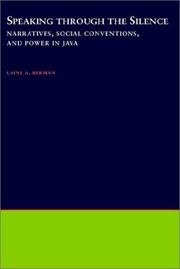
ISBN: 1280453087 0195355229 1423759397 160256146X 9781423759393 9781602561465 9786610453085 661045308X 0195108884 9780195108880 0195108892 0197722482 Year: 1998 Publisher: New York : Oxford University Press,
Abstract | Keywords | Export | Availability | Bookmark
 Loading...
Loading...Choose an application
- Reference Manager
- EndNote
- RefWorks (Direct export to RefWorks)
Uncovering the structures and functions of conversational narratives uttered within natural social networks, the author shows how working-class Javanese women discursively construct identity and meaning within the constraints of a hierarchical social order through silences, or the ""unsaid"".
Javanese language --- Speech and social status --- Social classes and language --- Social classes and speech --- Social status and language --- Social status and speech --- Speech and social classes --- Social status --- Malayan languages --- Address, Forms of. --- Social aspects. --- Usage. --- #VCV monografie 1999 --- Address, Forms of --- Social aspects --- usage --- Javanais (Langue) --- Langage et statut social --- Titres de politesse --- Aspect social --- Usage --- usage.
Book
ISSN: 14301180 ISBN: 3487400049 9783487400044 3487145758 9783487145754 9783487145754 Year: 2011 Volume: Bd. 25 Publisher: Hildesheim ; New York : G. Olms,
Abstract | Keywords | Export | Availability | Bookmark
 Loading...
Loading...Choose an application
- Reference Manager
- EndNote
- RefWorks (Direct export to RefWorks)
Hauptbeschreibung Ein Personenname kennzeichnet den einzelnen Menschen und gibt ihm eine ureigene Individualität. Hierbei ist wiederum der Ruf- bzw. Vorname von großer Bedeutung, da er von den Eltern frei wählbar ist. Die Rufnamenwahl als gedanklicher Prozess unterliegt jedoch verschiedenen Kriterien, welche die Entscheidung für oder gegen einen Namen beeinflussen. Jede Namenwahl drückt die Einstellung eines Namengebers aus, die durch gesellschaftliche Einflüsse mehr oder weniger stark gelenkt wird. Vor allem das direkte soziale Umfeld bestimmt, welche Kriterien für die Rufnamen
Names, Personal --- Speech and social status. --- Social classes and language --- Social classes and speech --- Social status and language --- Social status and speech --- Speech and social classes --- Social status --- Anthroponomy --- Baby names --- Christian names --- Family names --- Forenames --- Names of families --- Names of persons --- Personal names --- Surnames --- Names --- Onomastics --- Social aspects --- Social aspects.
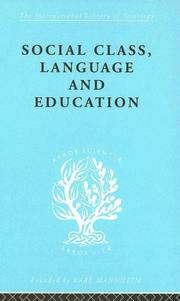
ISBN: 1134685130 128056671X 9786610566716 020300129X 9780203001295 9780415176330 0415176336 0710034903 0415176336 9780710034908 0710068956 9781134685080 9781134685127 9781134685134 9781138982161 1134685122 9780710068958 Year: 1970 Publisher: London Routledge
Abstract | Keywords | Export | Availability | Bookmark
 Loading...
Loading...Choose an application
- Reference Manager
- EndNote
- RefWorks (Direct export to RefWorks)
Titles in the Class, Race and Social Structure set of the International Library of Sociology consider every problem of socio-political importance that affected society in the years following the Second World War.
Language and education. --- Social aspects. --- Sociolinguistics. --- Speech and social status. --- Education --- Social Sciences --- Theory & Practice of Education --- Children --- Educational sociology --- Sociolinguistics --- Language development in children --- Interpersonal communication in children --- Language and languages --- Language and society --- Society and language --- Sociology of language --- Language and culture --- Linguistics --- Sociology --- Integrational linguistics (Oxford school) --- Education and sociology --- Social problems in education --- Society and education --- Sociology, Educational --- Language --- Vocabulary --- Social aspects --- Sociological aspects --- Aims and objectives --- Educational sociology. --- Language. --- Social stratification --- Sociology of education --- Children - Language
Book
ISBN: 9027271348 9789027271341 1299941486 9781299941489 9789027206428 9027206422 Year: 2013 Publisher: Amsterdam
Abstract | Keywords | Export | Availability | Bookmark
 Loading...
Loading...Choose an application
- Reference Manager
- EndNote
- RefWorks (Direct export to RefWorks)
This monograph is about how the Scots language is discursively constructed, both from 'above' (through texts such as educational policies, debates in parliament and official websites) and from 'below' (in focus group discussions among Scottish people). It uses the interdisciplinary discourse-historical approach to critical discourse analysis to examine what discursive strategies are used in different texts, and also to investigate salient features of context. This allows a broader discussion of the role of this language in Scotland, and how different ways of constructing a language can percolate
Scots language --- Speech and social status --- Language and culture --- National characteristics --- Characteristics, National --- Identity, National --- Images, National --- National identity --- National images --- National psychology --- Psychology, National --- Anthropology --- Nationalism --- Social psychology --- Collective memory --- Ethnopsychology --- Exceptionalism --- Culture and language --- Culture --- Social classes and language --- Social classes and speech --- Social status and language --- Social status and speech --- Speech and social classes --- Social status --- English language, Scots --- Lallans language --- Lowland Scots language --- Scots English language --- Scottish language (Germanic) --- English language --- Germanic languages --- Discourse analysis. --- Dialects
Book
ISBN: 9780813161310 0813161312 0813130212 0813160294 Year: 1988 Publisher: Lexington The University Press of Kentucky
Abstract | Keywords | Export | Availability | Bookmark
 Loading...
Loading...Choose an application
- Reference Manager
- EndNote
- RefWorks (Direct export to RefWorks)
No other American novelist has written so fully about language -- grammar, diction, the place of colloquialism and dialect in literary English, the relation between speech and writing -- as William Dean Howells. The power of language to create social, political, and racial identity was of central concern to Americans in the nineteenth century, and the implications of language in this regard are strikingly revealed in the writings of Howells, the most influential critic and editor of his age.In this first full-scale treatment of Howells as a writer about language, Elsa Nettels offers a historic
Race in literature. --- Americanisms in literature. --- Social classes in literature. --- English language --- Language and languages in literature. --- Speech and social status --- National characteristics, American, in literature. --- Social classes and language --- Social classes and speech --- Social status and language --- Social status and speech --- Speech and social classes --- Social status --- American English --- American language --- English language in the United States --- Americanisms --- Howells, William Dean, --- Howells, W. D. --- Howells, William D. --- Knowledge --- America. --- Germanic languages
| Listing 1 - 10 of 12 | << page >> |
Sort by
|

 Search
Search Feedback
Feedback About UniCat
About UniCat  Help
Help News
News